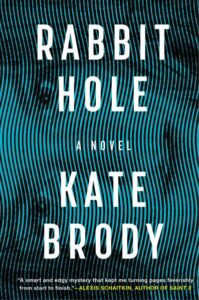
Life Concentrated: Kate Brody on Writing About the Internet
“This is how we live now. What do we have to say about it?”
For years, I avoided technology in my work. Despite my poor research habits, I’d set stories in the decades before my own birth, or worse, I’d construct the literary equivalent of a black box, a setting devoid of temporal artifacts where eternal human struggles could play out without the interference of pesky cell phones. This impulse was born out of fear.
I had seen other writers get our modern lives wrong. As a reader, I had cringed when text messages turned sharply written dialogue tinny and hollow. When it came to the Internet, I spent so much time online that I could hear every wrong note. But it was for the same reason that I ultimately decided I had to face my fears and write a book that would deal with contemporary issues head-on. Like it or not, this is how we live now—half-flesh and half-username. To avoid it entirely also rings false.
I knew from the get-go that Rabbit Hole would feature Reddit’s true crime communities, and I worried about how I would translate pages and pages of nesting, nonsensical, vitriolic, funny, and bizarre comments into something fictionally cogent. Like with so many writing problems, the way in was through craft.
Different elements of our online lives speak to different elements of craft. In my obsession with this topic, I have developed a theory of sorts, and I’ll lay it out using following texts as case studies: Berlin by Bea Setton, Aesthetica by Allie Rowbottom, No One is Talking About This by Patricia Lockwood, and Hotels of North America by Rick Moody.
To the write the Internet convincingly, you first need to pay close attention. Another way of thinking about this boils down to the old adage “make the familiar strange.” When I interviewed Bea Setton for Write or Die, I asked her how she wrote the section of Berlin where the narrator, Daphne, classifies her online dating suitors. As a reader, it had struck me as both true to life and fresh. Bea noted, right off the bat, that the specificity of each detail was born out of her own observations: “I did extensive fieldwork. Ethnographic research. I went on the apps, and I swiped.”
Similarly, Allie Rowbottom has talked about her own organic interest in Instagram, something with which she is both intimately familiar and anthropologically estranged: “Part of the reason why I wanted to write the book was that I was spending a lot of time on Instagram and [I was] feeling, like, really weird about it.”
To the write the Internet convincingly, you first need to pay close attention.
So step one is basically: pretend you are an alien. You just got here, wherever here is—Tinder, Reddit, Instagram. What do you see? What is strange about this way of interacting?
After you’ve noticed all there is to notice about the platform you are interested in writing about, you can start to think about the craft of it. This is step two, the most important.
Twitter (the basis of the “portal” in Lockwood’s No One Is Taking About This) calls poetic forms to mind. Tweets require significant economy. They rely on negative space, on word choice, on repetition (retweets). Lockwood, a poet herself, plays with all of these elements in No One is Talking About This. The craft of her work mirrors the elements intrinsic to the real app.
Instagram, on the other hand, is photo-based, so Rowbottom leans into imagery. She contrasts descriptions of perfectly curated Instagram posts with potent, upsetting images of bikini waxing, cancer treatment, and assault. She leans into metaphor, into the body, into frozen moments in time. She mimics the platform.
In Hotels of North America, a novel which is written as a series of online hotel reviews, Rick Moody notices what is strange about reviews—the way people on Yelp or TripAdvisor establish authority, the way they divulge information about their lives—and then he connects it to craft. Hotels is all about character. Through the reviews, we learn the entire backstory of their writer, Reginald Edward Morse. They are a vessel for his loneliness, as well as his desire for some shred of power.
In Berlin, Bea Setton focuses on point of view. Online dating, after all, is defined by its interactivity. One cannot passively consume dating profiles. One stands in judgment and sorts: winners and losers. Whether a profile goes left or right depends on who you are and what you want. Hence, point of view. Daphne is a graduate student. So how would she respond to this task? Of course—she footnotes. She creates a taxonomy: “Readers of the Little Prince,” “Men with Sisters,” “Allies,” “Conspiracy Theorists,” “Men Who Dislike Women,” “G.I. Joes,” “Clever, Cultured Men,” and “Lovely, Wonderful Men.”
For my part, I spent a lot of time of Reddit. In true crime communities, sure, but also on subreddits that made sense for my life. For instance, when I was expecting, I joined groups for expectant parents. When I was writing Rabbit Hole, I joined groups about writing. I thought about how it felt to be a part of the community, and I thought about what makes Reddit unique:
It is largely text-based
It is basically anonymous (not a popularity contest, like Twitter or Instagram)
Users seek their communities (minimal reliance on followers or algorithmic mixing)
Voice, I found, was Reddit’s defining craft element. Every time I logged on, I was struck by the sense that I was listening to a cacophony of distinct and disembodied voices. I considered how to recreate that chorus on the page. I worried that the users would sound alike, since they were all me, so I played by ear, tinkering with things like profanity, fragmentation, capitalization, and even frequency of response. Some usernames talked a lot; some, a little. Some cursed; some were clean. Some wrote in full sentences, with complete punctuation. Others used internet shorthand and misspellings.
When all that was done, I distilled. This is the third and final step. As much as I hate reading bad Internet writing, I hate reading the Internet. In any given scroll, 80% (at least) is unremarkable garbage. But art is life concentrated. High octane human experience. As a writer, it is your job to edit out the filler, leaving only what the reader needs. Like great dialogue, every great piece of writing about the Internet should advance characterization, plot, or both. It is not enough to simply point out what we all know and can see for ourselves.
The TL;DR version: Don’t lean on caricature and bad impressions. Simply, look at your own online world slant, find the craft element at its heart, and reduce your writing down to its most potent form. This is how we live now. What do we have to say about it? And more importantly, what does it have to say about us?
__________________________________

Rabbit Hole by Kate Brody is available from Soho Press.
Kate Brody
Kate Brody lives in Los Angeles, California. Her work has previously appeared in Lit Hub and The Literary Review, among other publications. She holds an MFA from NYU. Rabbit Hole is her debut novel.



















